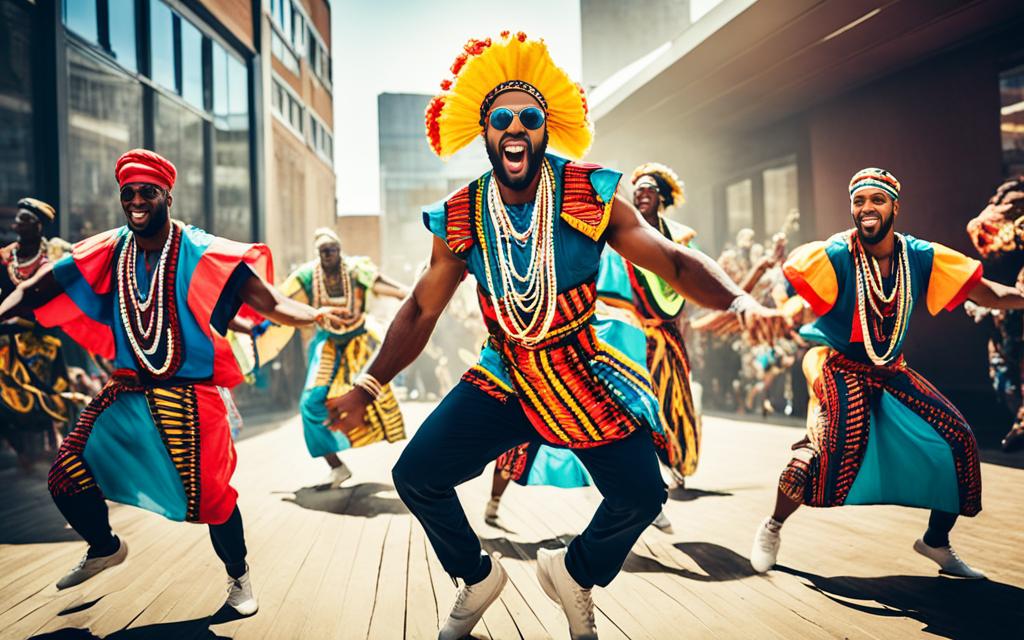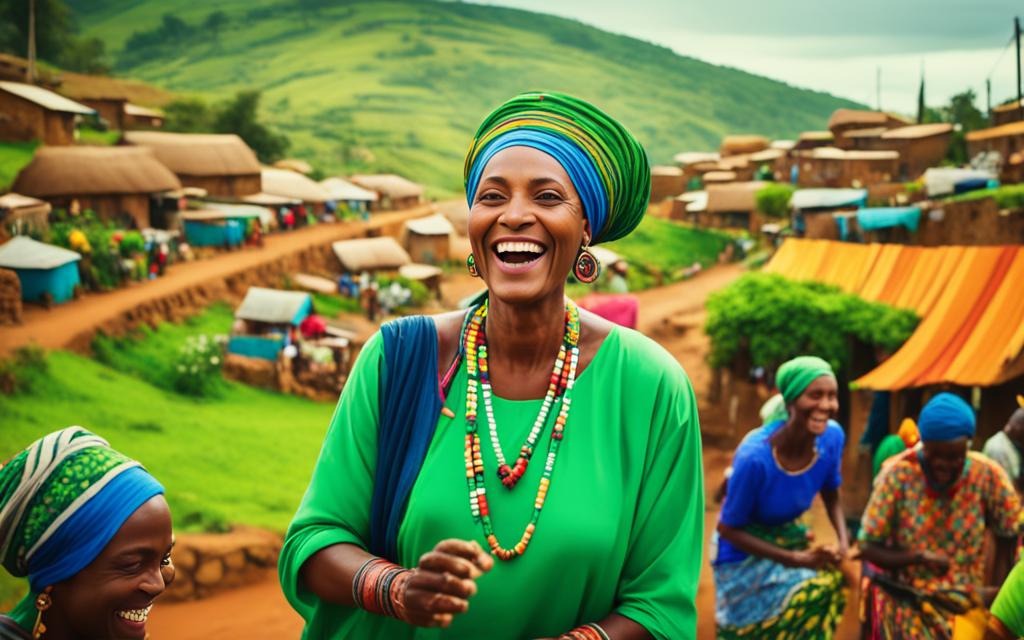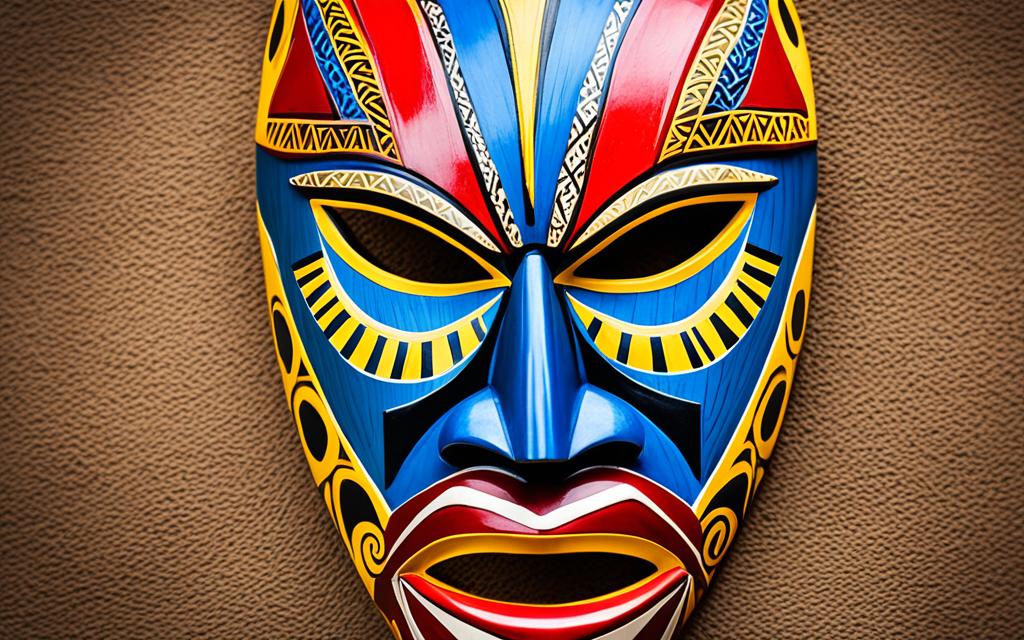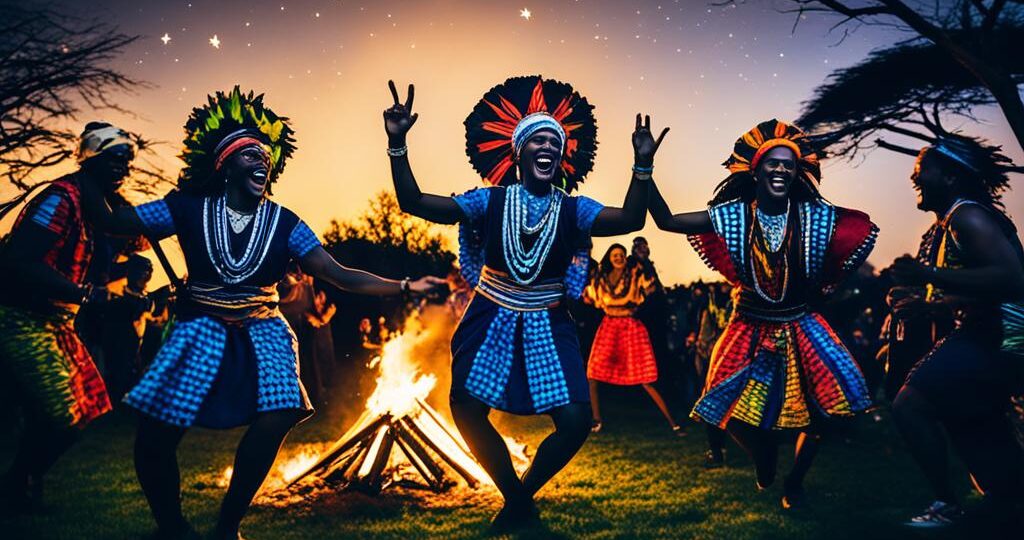
Have you ever wondered about the vibrant and enchanting sacred celebrations in African cultures? From birth to death, these rituals and ceremonies hold immense cultural significance and reflect the deep-rooted traditions and beliefs of the continent. But what makes them so unique? What stories do they unravel? Join us as we venture into the captivating world of African sacred celebrations and explore the rich tapestry of rituals and ceremonies that form an integral part of African heritage.
Key Takeaways:
- African cultures have a diverse range of sacred celebrations that mark important milestones and transitions in life.
- These sacred celebrations reflect the deep-rooted traditions and beliefs of African communities.
- Through exploring African rituals and ceremonies, we can gain a deeper appreciation for the cultural significance they hold.
- African sacred celebrations provide insights into the spiritual beliefs and practices that have been passed down through generations.
- By understanding and appreciating these rituals, we can foster a greater respect for the diversity and depth of African cultures.
Exploring African Cultural Ceremonies
In this section, we invite you to delve into the captivating world of African cultural ceremonies and rituals. These traditions hold immense importance within African communities, marking significant milestones and transitions in life. By understanding and appreciating these sacred traditions, we can gain a deeper understanding of African cultures and their rich heritage.
Throughout the African continent, a diverse range of cultural ceremonies are celebrated, each with its own unique customs and rituals. From the vibrant coming of age ceremonies that symbolize the transition from adolescence to adulthood, to the sacred initiation rituals that signify spiritual growth and cultural identity, African communities partake in these events with great reverence and joy.
Wedding celebrations, too, play a central role in African cultures, highlighting the union of two individuals and the joining of families. The wedding ceremonies are often colorful and exuberant, embodying the cultural values and traditions of the community. These celebrations are a testament to the commitment and love shared between the couple, as well as the unity of the larger community.
Let us not forget the powerful and reverent ceremonies surrounding death and the remembrance of ancestors. African cultures honor their ancestors through sacred rituals, paying respect to their memory and seeking guidance and blessings. These spiritual ceremonies connect the living and the deceased, upholding a profound sense of ancestral reverence that shapes the fabric of African societies.
“African cultural ceremonies are a testament to the rich heritage and traditions that exist on the continent.”
Diving into the depths of African cultural ceremonies allows us to witness the beauty and significance of these sacred traditions. It is through these ceremonies that African cultures pass down their values, beliefs, and collective identity from one generation to the next. By participating in and truly understanding the essence of these ceremonies, we can foster greater respect and appreciation for the diversity and depth of African traditions.
African Cultural Ceremonies: Key Examples
| Ceremony | Description |
|---|---|
| Coming of Age Ceremonies | Celebrations marking the transition from adolescence to adulthood, often including rites of passage and initiation rituals. |
| Wedding Celebrations | Union between two individuals and the joining of families, exuding cultural traditions, customs, and symbolic rituals. |
| Ancestral Remembrance | Rituals honoring ancestors, symbolizing the ongoing connection between the living and the deceased. |
| Naming Ceremonies | Celebrations held to give a newborn their name, emphasizing the importance of community and ancestral blessings. |
Throughout Africa, cultural ceremonies serve as a vibrant tapestry that weaves together the stories and traditions of diverse communities. Join us as we embark on a journey to uncover the beauty and meaning behind these sacred rituals and ceremonies, exploring the depths of African cultures and the sacred traditions they hold dear.
Diving into Sacred Rituals Across Africa
In this section, we will explore the fascinating world of sacred rituals across various regions of Africa. These cherished traditions and ceremonies are deeply rooted in African heritage and play a vital role in preserving cultural identity and spirituality. From vibrant festivals to solemn ceremonies, let us embark on a journey to uncover the rich tapestry of African rituals.
One of the most renowned African rituals is the Damballah Wedo ceremony, celebrated by the Vodou community in Benin and Haiti. This sacred ritual pays homage to the serpent deity, Damballah, who represents creation and wisdom. The ceremony includes elaborate dances, music, and offerings, creating a spiritually immersive experience.
The Damballah Wedo ceremony is a powerful testament to the intricate connection between African communities and their spiritual beliefs.
Across the continent, the Timkat festival in Ethiopia is a vibrant celebration of the Epiphany, commemorating the baptism of Jesus Christ. During this colorful event, thousands of participants gather to witness the reenactment of the baptismal ceremony, accompanied by traditional music, dance, and processions.
Exploring West Africa, the Ogun festival held by the Yoruba people honors the god of iron, Ogun. This sacred festival showcases the unique blend of martial arts, religious rites, and cultural performances, reflecting the importance of Ogun in the Yoruba society.
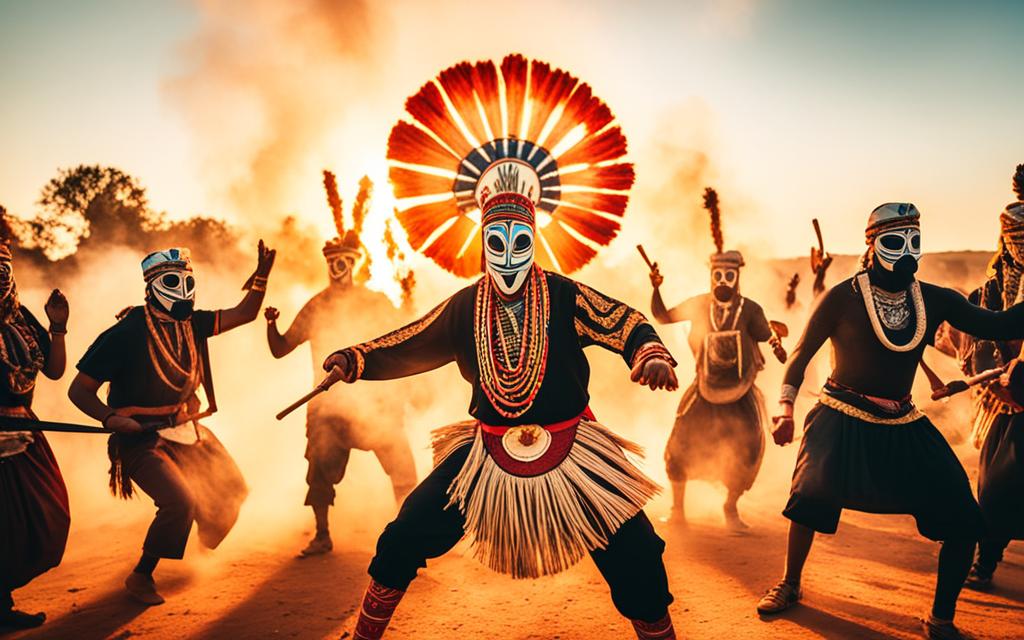
African Heritage Celebrations: A Cultural Kaleidoscope
These are just a few examples of the countless sacred rituals that grace African cultures. The diversity of traditions and beliefs across different African communities showcases the richness and complexity of the continent’s heritage celebrations.
From the soul-stirring Rwandan Umuganda, where communities unite in a spirit of collective responsibility, to the mystical Zulu Reed Dance in South Africa, which celebrates the coming of age of young maidens, African rituals serve as a powerful reminder of the strong ties between spirituality, culture, and identity.
| Ritual | Country | Celebration |
|---|---|---|
| Damballah Wedo ceremony | Benin, Haiti | Worship of serpent deity Damballah |
| Timkat festival | Ethiopia | Commemoration of Jesus’ baptism |
| Ogun festival | Nigeria | Honoring the god of iron, Ogun |
| Umuganda | Rwanda | Collective community work |
| Zulu Reed Dance | South Africa | Celebration of young maidens |
As we delve into these sacred rituals, we recognize the importance of preserving and appreciating African cultures. These celebrations serve as living testimonies to the depth of African traditions and the resilience of its people. Through a greater understanding of African rituals, we can foster cross-cultural appreciation and celebrate the diversity that brings our world together.
Conclusion
In conclusion, the sacred celebrations, rituals, and ceremonies across African cultures are a testament to the rich heritage and traditions that exist on the continent. These sacred traditions hold immense cultural significance and provide a deeper understanding of the African way of life. From birth to death, African cultures celebrate various milestones and transitions through these sacred rituals.
By exploring and appreciating these sacred celebrations, we can foster a greater respect for the diversity and depth of African cultures. Each ritual and ceremony offers a unique glimpse into the values, beliefs, and spiritual practices of different African communities. These sacred traditions not only connect people to their ancestors but also strengthen the bonds within families and communities.
Join us as we embark on a journey to uncover the beauty and meaning behind these sacred rituals and ceremonies. By delving into the vibrant and diverse tapestry of African cultures, we can gain a greater appreciation for the traditions that have been passed down through generations. Through understanding, respect, and celebration, we can continue to preserve and honor the sacred celebrations that define African cultures.
FAQ
What are sacred celebrations in African cultures?
What types of cultural ceremonies are practiced in African communities?
What are some examples of sacred rituals across Africa?
Why are these sacred celebrations and rituals important?
How can I learn more about African sacred traditions?
RELATED POSTS
View all
